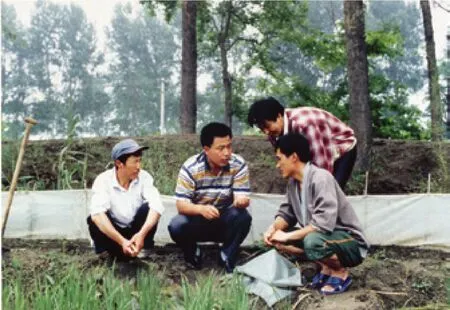The King of Crabs
By HU YUE
The King of Crabs
By HU YUE
An innovative entrepreneur and Party member’s tale of success amid hardships and obstacles
Knowledge can change one’s life. That is how 46-year-old Li Xiaodong describes his rags-to-riches story.Li’s resume glows. He is chairman of Panjin Guanghe Aquaculture Co. Ltd.in northeast China’s Liaoning Province and secretary of the Committee of the Communist Party of China of the company.The private company is China’s largest supplier of crab larvae, with a market share of 10 percent in 2010. It is expected to generate net pro fi ts of more than 10 million yuan($1.54 million) in 2011, doubling that of last year.
Li started his road to success from scratch. After graduating from the Dalian Fisheries School in 1984, Li, then 21, gave up a decent job in Dalian, a coastal city in Liaoning, and returned to his hometown in Dawa County to work as a technician with the Bureau of Aquatic Products and later a subsidiary company.
“Born to a dirt-poor family, I always had the dream of helping fellow villagers get out of poverty,” Li toldBeijing Review.
In those early years, Li spent days and nights researching and experimenting with arti fi cial cultivation of crab larvae. His dedication was so steadfast that even thoughts of food and sleep vanished. A breakthrough happened in 1992 when an innovative idea occurred to him: raising crabs in rice fi elds.
Li said the method could allow farmers to make better use of rice fields, which account for 70 percent of Panjin’s farmland. Moreover,the crabs could loosen the soil and eat harmful insects. Crab excrement also acts as natural fertilizer.
Li shared his knowledge and techniques with local farmers and helped promote the new method across the province. This delivered a strong boost to farmers’ incomes. For Panjin, the emerging breeding industry injected fresh life into the local economy as the city struggled with the exhaustion of its oil resources. Li was therefore dubbed the King of Crabs in the province.
On Li’s career path, a turning point came in 1999 when the government began restructuring the local economy and closed down a batch of poor-performing state-owned enterprises, including Li’s employer.
“I had the option to transfer to other government departments and remain in the civil service,” he said. “Still, I decided to quit a secure job and start up my own business.”
Many of his friends and relatives argued against his decision.
“But I have never regretted it despite a lot of ensuing frustrating setbacks,” Li said.“I have always been an optimist and seldom thought of what would happen if I failed.”
Li’s company moved downstream to develop processed crab products and quickly gained a solid market foothold thanks to a close tie-in with rural households. Contracted farmers buy crab larvae from the company and raise them on their own. After the crabs grow, farmers sell them back to the company at a set price, which allows the farmers to make some extra cash.
“This kind of business model ensures sustainable crab supplies to my company and at the same time safeguards farmers’ interest,” Li said.
At first, however, many farmers were reluctant to join the contract out of concerns over the survival ratio of the crabs.
“After all, it would cost almost their life savings as initial investment was at least 30,000 yuan ($4,615) for each household,”Li said. “In response, we improved the quality of the larvae and sent assistants to help farmers address technical problems.”
As a few rural households generated handsome returns, more farmers rushed to follow suit. Now the company has teamed up with more than 9,000 rural households,around 40 percent of the total in Panjin.
In 2003, severe acute respiratory syndrome (SARS) swept the country, putting a dent in consumer con fi dence. The market prices of crabs nosedived to around 3 yuan(46 cents) per kg, well below the preset contract price of 12 yuan ($1.8). Through negotiations, Li and the farmers reached an agreement under which his company purchased the crabs at 6 yuan (92 cents) a kg.The company suffered a painful loss of more than 4 million yuan ($615,385).
“Inside the company, some people questioned the decision,” Li said. “But I insisted our priority was to protect farmers’ interests.”
Li’s efforts paid off. Because of its unselfish acts, the company established its reputation among farmers. When the market recovered a year later, the company raked in healthy pro fi ts of 5 million yuan ($769,231).
Li said there are 68 Party members in the company, nearly 20 percent of the total employees, making signi fi cant contributions to corporate development.
“They have shouldered the most arduous tasks and set a good example for other colleagues,” he said.

HELPING LOCALS: Li Xiaodong (second left), Chairman of Panjin Guanghe Aquaculture Co. Ltd. and secretary of the Party committee of the company,helps farmers grow crabs in their rice fields

